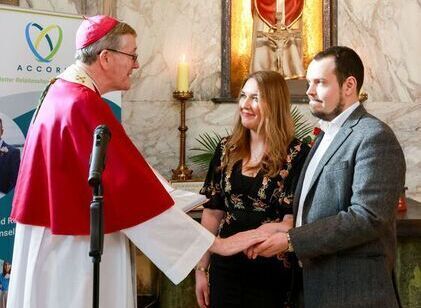[caption id="attachment_68377" align="aligncenter" width="600" caption="Elizabeth McEvoy, Archivist and Treaty Manager, Taoiseach Enda Kenny and Minister Jimmy Deenihan at the launch of "Treaty" Online Exhibition at the National Archive. "]
The original Anglo-Irish Treaty, which led to the partition of the island in 1921, has been published online for the first time.
The historic document, which officially ended the War of Independence, but sparked civil war in Ireland, is now available to view online to mark 90 years since it was signed by - among others , republican icon Michael Collins and then British delegate Winston Churchill, who was later prime minister.
The National Archives of Ireland acquired the document - said to be still in "excellent condition" - from the Department of the Taoiseach back in 2002, but it has never before been made public online.
One of the most important documents in the history of Anglo-Irish relations, the "Articles of Agreement between Great Britain and Ireland" was signed at 2.15a.m. on December 6 1921, against the backdrop of a British threat of further war should a solution not be reached.
The Treaty founded the Irish Free State, and the creation of Northern Ireland, which remained part of the United Kingdom. It led to further bloodshed in the civil war, with opponents of Collins branding him a "traitor" for signing his name to the document.
Irish Minister for Arts, Jimmy Deenihan, said as the Treaty went online this week: "The Irish delegation had traveled to London in October of that year and after weeks of negotiations they were faced with a very stark reality: a choice of returning to Dublin and the resumption of war, or the signing of the Treaty.
"Irrespective of your political persuasions, this exhibition has no bias and no agenda. It is simply an excellent opportunity for the public to see, not only the Treaty itself, but also the papers leading up to the signing of the Treaty. My hope is that this exhibition will bring to life the story of the establishment of the Irish Republic to a much wider audience than before."
The Treaty and related documents can be viewed at www.nationalarchives.ie.









